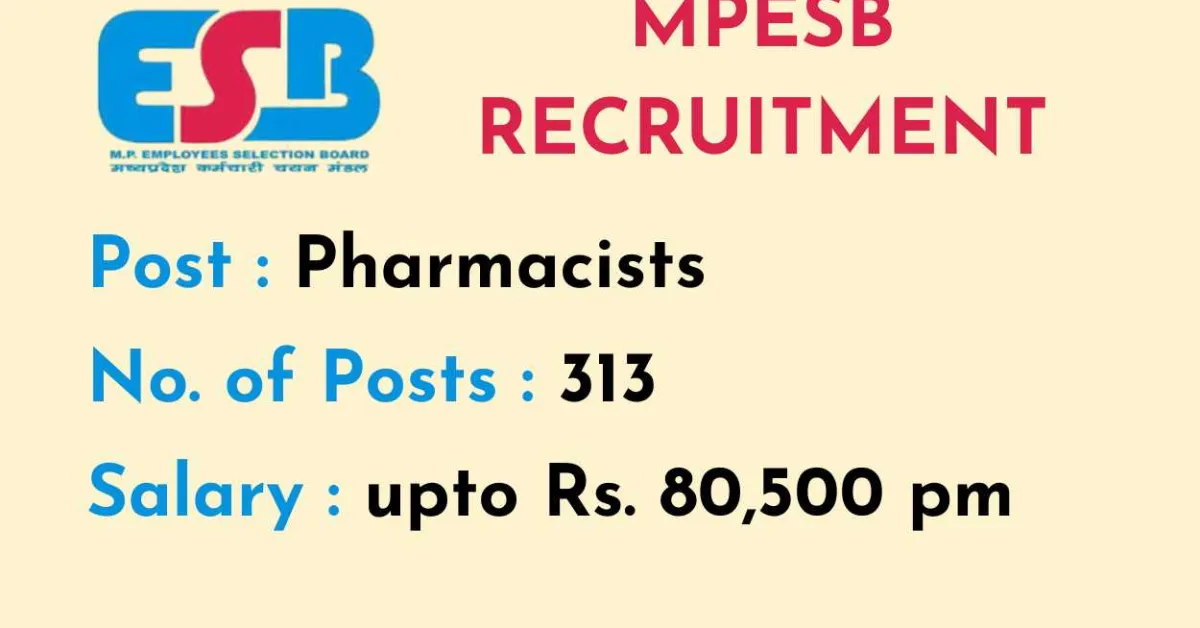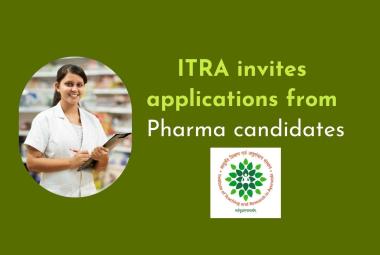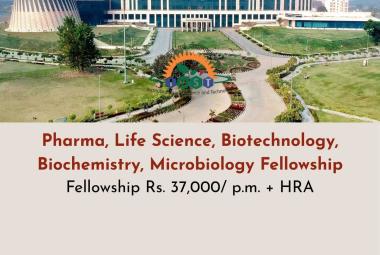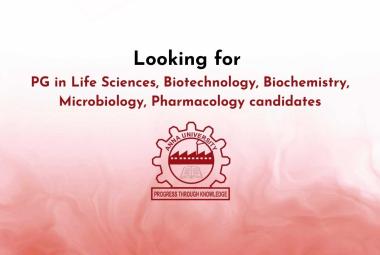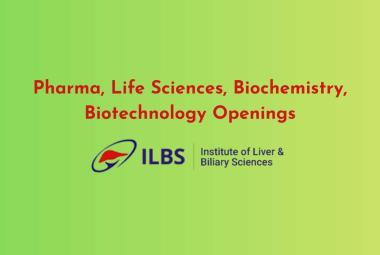The Madhya Pradesh Employees Selection Board (MPESB), previously the Madhya Pradesh Professional Examination Board and commonly known as Vyapam (an abbreviation of its Hindi name Madhya Pradesh Vyavsayik Pariksha Mandal), is a government agency of Madhya Pradesh, India. It conducts various tests for admission to professional courses and streams. It is the largest examination conducting body of Madhya Pradesh government and comes directly under the Directorate of Technical Education (Government of Madhya Pradesh). The Madhya Pradesh Employees Selection Board is a self-financed, autonomous incorporated body of State Govt.
Post : Pharmacist Grade - 2
No of posts : 313 (UR-85, EWS-31, SC-50, ST-63, OBC-84)
Pay Scale : 7th Pay Scale 25300-80500 - Level-6
Minimum Educational Qualification (1) Should have passed Higher Secondary Examination or 12th Class Examination in 10+2 Education System (with Biology, Chemisty and Physics),
(2) Diploma in Pharmacy or B-Pharma Degree in Pharmacy or M-Pharma Degree in Pharmacy as approved by any University established by law or any other institution recognized by the State Government in this behalf,
(3) Pharmacist in Madhya Pradesh Pharmacy Council (Pharmacist) Live registration as.
Note:-
1. There is a possibility of change in the figures of posts shown in the above table.
2. The contract rules will be applicable as per the instructions given in the circular number C-5-2/2018/A/3, dated 22 July 2023 of the General Administration Department, Ministry.
3. The guidelines issued from time to time by the General Administration Department, Ministry will be applicable.
Age Limit -
(A) For all those posts for which the Public Health and Medical Education Department is conducting eligibility test for limited direct recruitment to regular posts of Physiotherapist, Counselor, Pharmacist Grade-2, Ophthalmic Assistant and OT Technician of Paramedical Cadre under Madhya Pradesh, the minimum age limit will be 18 years and maximum age limit will be 40 years. The age limit for Scheduled Castes/Scheduled Tribes/Other Backward Classes, Government servants working in Departments/Corporations/Boards/Commissions/Autonomous Bodies/Home Guards and female candidates will be 45 years. Regarding the maximum age limit, the amendments issued from time to time by the General Administration Department will be deemed to be applicable. The age limit will be calculated as on 1st January of the current year of recruitment i.e. 1st January 2025. (B) As per circular number 73/104/2022/A.P./2021, dated 02.02.2022 of MP Government, General Administration Department, Bhopal, there is no provision for age relaxation for the candidates of economically weaker section (EWS). But further that the relaxation in maximum age limit to be given to physically handicapped / ex-servicemen will be as per the orders / guidelines issued by the General Administration Department from time to time. But also that in no case, including all types of relaxation, the maximum age limit for this examination for any category will exceed 45 years (except contract workers and the categories given in Rule No. 13).
Age limit for applicants who are permanent residents of Madhya Pradesh: –
(i) The age of the candidate will be calculated from 01 January 2025
(ii) According to the letter No. C-3-11/12/1/3, dated 03.11.2012, letter No./C.3- 11/2012/3 Bhopal dated 13 January 2016, amended order No. C 3-8/2016/3-A Bhopal dated 12 May 2017 and C 3-8/2016/1/3 Bhopal dated 04 July 2019 of General Administration Department, Government of Madhya Pradesh, the age limit of the candidates falling under the following categories is calculated as follows:-
For posts to be filled through direct recruitment through open competition : 18 to 40
For SC, ST, OBC, Government/Corporation/Board/Owner Institution employees/Nagar Sainik/Divyangjan/Women (Unreserved/Reserved) etc. who are natives of M.P.: 18 to 45
(With relaxation of 05 years in maximum age limit)
For all posts, it will be mandatory for the candidates to have a live registration in the employment office of Madhya Pradesh State. The valid certificate required for reservation and relaxation in age limit must be issued by a valid/competent officer of Madhya Pradesh Government.
Exam Fee
For Direct Recruitment / Contract Recruitment Posts
For Unreserved Candidates : Rs. 500/- per Question Paper
For SC/ST/OBC/EWS/Divyangjan Candidates who are native of Madhya Pradesh only : Rs. 250/- per Question Paper
Only for Direct Recruitment - Backlog : No Fee
For candidates filling online application form through kiosk, MPOnline portal fee of Rs. 60/- will be payable. In addition, portal fee of Rs. 20/- will be payable on filling the form by logging in through registered citizen user.
Regarding citizenship and permanent residence:-
(1) A candidate for appointment to the post
(a) must be a citizen of India.
(b) can be a citizen of Nepal.
(c) If (b) is the case then it is necessary to issue a certificate under the applicable rules of M.P. Civil Services Recruitment Rules 1961. Note:- Any candidate in whose case a certificate of eligibility is necessary may be finally appointed subject to the fact that the necessary certificate is finally issued in his favour by the State Government as per M.P. Civil Services Recruitment Rules 1961.
(II) Such candidates who are not permanent residents of Madhya Pradesh can submit their application only for the vacant posts under unreserved/open. Such applicants will not get any benefit of reservation or relaxation in age limit.
Fee reimbursement amount will be paid to the candidates of SC/ST/OBC category as per the guidelines issued by the General Administration Department from time to time.
As per the circular dated C. 3-13/2019/3/1 dated 12 December, 2019 of the General Administration Department, Government of Madhya Pradesh, the minimum pay scale will be payable as 70% in the first year, 80% in the second year and 90% in the third year. On successful completion of the probation period, salary will be started in the pay scale. (Approved by Commissioner of Health)
Exam Syllabus
PHARMACEUTICS
Introduction to different dosage forms, their classification with examples-their relative applications. Familiarization with new drug delivery systems. Introduction to Pharmacopoeias with special reference to the Indian Pharmacopoeia. Size reduction, Size separation, Metrology-system of weights and measures. Calculations including conversion from one to another system. Percentage calculations and adjustment of products. Use of alligation method in calculations. Isotonic solutions. Mixing and homogenization. Packaging of pharmaceuticals Extraction and galenicals, Clarification and filtration, Heat processes, Introduction to drying processes, Distillation, Sterilization-concept of sterilization and its differences from disinfection-thermal resistance of microorganisms. Detailed study different sterilization processes. Study of immunological products like sera, vaccines, toxoids and their preparations., Processing of tablets, Processing of capsules.
PHARMACEUTICAL CHEMISTRY
Acids, bases and buffers, Gastrointestinal agents, Acidifying agents, Antacids, Protectives and adsorbents, Saline cathartics. Antioxidants, Topical agents - (i) Protectives (ii) Antimicrobials and astringents (iii) Sulphur and its compounds (iv) Astringents-alum and zinc sulphate. Dental product, Inhalants, Respiratory stimulants, Expectorants and emetics, Antidotes. Major intra and extracellular electrolytes, Inorganic official compounds of iron, iodine and calcium; ferrous sulfate and calcium gluconate. Radio pharmaceuticals and contrast media radioactivity, Identification tests for cations and anions as per Indian Pharmacopoeia. Quality control of drugs and pharmaceuticals.
PHARMACOGNOSY
Definition, history and scope of pharmacognosy including indigenous system of medicine. Various systems of classification of drugs of natural origin. Adulteration and drug evaluation; significance of pharmacopoeial standards. therapeutic effects and pharmaceutical applications of alkaloids, terpenoids, glycosides, volatile oils, tannins and resins. Occurrence, distribution, organoleptic evaluation, chemical constituents including tests wherever applicable and therapeutic efficacy of (a) Laxatives (b) Cardiotonics (c) Carminatives & G.1.regulators catechu. hyoscyamus, belladonna, aconite, ashwagandha, ephedra, opium, cannabis, nux vomica. rauwolfia. vasaka, tolu balsam, tulsi. guggal, colchicum, vinca. chaulmoogra oil. pterocarpus, gymnema sylvestro. gokhru, punarnava. ipecacuanha. benzoin, myrrh, neem, curcuma. cinchona. ergot. shark liver oil and amla. papaya, diastase, yeast. Collection and preparation of crude drugs from the market as exemplified by ergot, opium, rauwolfia, digitalis, senna. Study of source, preparation and identification of fibres used in sutures and surgical dressings-cotton, silk, wool and regenerated fibres.
BIOCHEMISTRY AND CLINICAL PATHOLOGY
Introduction to biochemistry. Brief chemistry and role of carbohydrates, proteins, lipids, their classification and related diseases. Role of minerals and water in life processes. Brief chemistry and role of vitamins and coenzymes. brief concept of enzymatic, Introduction to pathology of blood and urine.
HUMAN ANATOMY AND PHYSIOLOGY
Definition of various terms used in anatomy, physiology, Structure of cell, unction of its components with special reference to mitochondria and microsomes. Elementary tissues of the body, Composition of blood, blood group and coagulation of blood, Name and functions of lymph glands. Anatomy and physiology of different body systems in Brief.
HEALTH EDUCATION & COMMUNITY PHARMACY
Concept of health-definition, indicators of health, concept of disease, prevention of diseases. Environment and health. First aid- emergency treatment in shock, snake bite, burns, poisoning, heart disease, fractures and resuscitation methods. Elements of minor surgery and dressings. Fundamental principles of microbiology, organisms of common diseases. Non-communicable diseases- causative agents, prevention, care and control. Cancer, diabetes, blindness, cardiovascular diseases. Communicable disease- causative agents, modes of transmission and prevention. (a) Respiratory infections-chicken pox, measles, influenza, diptheria, whooping cough and tuberculosis. (b) Intestinal infections-poliomyelitis, hepatitis, cholera, typhoid, food poisoning, hookworm infection. (c) Arthropod borne infections-plague, malaria, filariasis. (d) Surface infections-rabies, trachoma, tetanus, leprosy. (e) Sexually transmitted diseases-syphilis, gonorrhoea, AIDS. Nutrition and health, vitamins and minerals. Demography and family planning, natural family planning methods, chemical methods, mechanical methods, hormonal, contraceptives, population problem of India. Epidemiology - I mmunity and immunisation, immunological products and their dose schedule. Principles of disease control and prevention, hospital acquired infection, prevention and control.
DISPENSING PHARMACY
Prescriptions: Reading and understanding of prescription; Incompatibilities in prescriptions, Posology: Dose and dosage of drugs, Dispensed Medications: (i) Powders (ii) Liquid oral dosage (b) Biphasic liquid dosage forms: • Suspensions • Emulsions (iii) Dental and cosmetic preparations: (iv) Semi-solid dosage forms: (a) Ointments (iv) emulsification. (v) Sterile dosage forms: (a) Parenteral dosage forms (b) Sterility testing, (c) Ophthalmic products- study of essential characteristics of different ophthalmic preparations.
PHARMACEUTICAL CHEMISTRY II
jchemistry of pharmaceutical organic compounds covering their nomenclature, chemical structure, uses and the important physical and chemical properties. The stability and storage conditions and the different types of pharmaceutical formulations of the drugs.
Pharmacology and Toxicology
Introduction to pharmacology, scope of pharmacology. Routes of administration of drugs, their advantages and disadvantages. Various processes of absorption of drugs and the factors affecting them. Metabolism, distribution and excretion of drugs. General mechanism of drugs action and the factors which modify drugs action. Pharmacological classification of drugs. (i) Drugs acting on the central nervous system: (a) General anaesthetics, intravenous anesthetics. (b) Analgesic, antipyritic, sedatives and hypnotics, anti- convulsants, (ii) Local anaesthetics. (iii) Drugs acting on autonomic nervous system. (iv) Drugs acting one eye, (v) Drugs acting on respiratory system (vi) Antacids, (vii) Cardiovascular drugs, (viii) Drugs acting on the blood and blood forming organs. (ix) Drugs affecting renal function (x) Hormones and hormone antagonists (xi) Drugs acting on digestive system
Pharmaceutical Jurisprudence
Note
1. Aadhar registration of the candidate is mandatory. E Aadhar will be valid only after it is verified by UIDAI.
2. It is mandatory to bring original photo identity card in the examinations conducted by the Board. The candidate can choose any one of voter ID card, pen driving license and passport as original photo identity card. In the absence of original photo identity card, the candidate may be barred from appearing in the examination. 3. Apart from the original identity card prescribed in the rule book, the candidate must bring his Aadhar card / e-Aadhar card / photocopy of Aadhar card / Aadhar number / Aadhar VID.
4. Multilevel biometric verification is mandatory at the time of entry into the examination and during the examination.
5. Candidates will be allowed to enter the examination center till the reporting time of the examination. After this, candidates arriving late will not be eligible for admission.
6. Use of electronic devices such as mobile phones, calculators, log tables, digital watches and cheating papers etc. in the examination hall is completely prohibited.
7. Candidates can obtain their admit card for online examination only through online application number. Hence, the entire responsibility regarding the application number will be of the applicant.
8. It will be mandatory for all candidates to have a live registration in the employment office of Madhya Pradesh State.
9. It is mandatory for the applicant to bring a ball point pen and the admit card downloaded from the Board's website to the examination centre for entry into the examination hall.
10. No candidate will be allowed to leave the examination hall after the commencement of the examination till the end of the examination.
11. The Board does not verify any certificate of the candidates while filling the application form. Hence, the eligibility for the computer based online exam will be completely provisional. The applicant should ensure that he/she possesses all the eligibility criteria like date of birth, age etc. for the post applied for as per the rules. If any information given by the applicant in the application form does not match with the original document/record or is not as per the rules, the candidature of the applicant can be cancelled at any level.
12. Candidates from special primitive tribal communities of Madhya Pradesh like Vaiga, Sahariya/Saharia and Bharia Scheduled Tribes will have to send separate applications to the Board in hard copy (in format-2 of the rule book) along with the necessary certificates for non-executive posts and not send the application form to the Board till the last date of filling the application form. The application form sent to the Board will be considered invalid.
Online Application Form
Start date for filling online application form : 28-07-2025
Last date for filling online application form : 11-08-2025
Start date for making corrections in application form : 28-07-2025
Last date for making corrections in application form : 16-08-2025
Nominated exam date and day : Start from 27 September 2025, Saturday
See All Bhopal Alerts B.Pharm Alerts D.Pharm Alerts M.Sc Alerts
See All Other Jobs in our Database
Subscribe to Pharmatutor Job Alerts by Email


